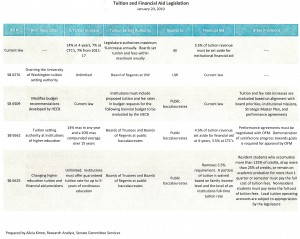The Senate Higher Education & Workforce Development Committee held a public hearing this afternoon focused on tuition policy. Four bills held the attention of Committee Members and a packed hearing room for nearly three hours.
SB 6276 – Grants the University of Washington tuition-setting authority.
SB 6562 – Authorizes the governing boards of the four-year, public institutions to set tuition and fees for resident undergraduate students with constraints, requires institutions to develop performance agreements with the state, and increases the amount that institutions must maintain for financial aid.
SB 6509 – Modifies the current budget proposal process between the HECB and the institutions to include recommendations on tuition and fees.
SB 6625 – Changes higher education tuition and financial aid provisions.
Each of the Senate bills approached tuition policy in a different way, especially with regard to levels of flexibility, required financial aid investments, and the establishment of performance agreements between the four-year public institutions and the State of Washington.
Students from across Washington expressed concerns regarding shifting tuition setting authority from the Legislature to the governing boards of the four-year, public institutions. Most students spoke in favor of SB 6509 and shared concerns about the three remaining bills. Students shared specific concerns with regard to SB 6562 including the high tuition cap, lack of oversight in the bill, and exclusion of graduate tuition and fees.
The six presidents of the public baccalaureate institutions spoke as a panel to the bills and tuition policy overall. Chair Kilmer captured the comments of the presidents well by restating five principles/themes he noted from their comments.
1. Optimize the state investment in higher education.
2. Any tuition policy does not release the state from its responsibility to fund higher education.
3. The unique missions and students mixes of each institution must be acknowledged relative to state appropriations, tuition, and financial aid.
4. Tuition policy should provide limits that will allow students greater predictability and stability.
5. Accountability of the institutions is a critical component of any tuition policy dialogue.
In his comments to the Committee, President Purce acknowledged the major role tuition plays in our higher education funding structure and the unprecedented economic times facing Washington, which will require non-traditional thinking and strategies to manage our public institutions.
Purce affirmed Evergreen’s long-held position on tuition by stating that the College believes that any conversation regarding higher education funding must integrate and acknowledge the interplay between state appropriations, financial aid, and tuition. In addition, he welcomed the active dialogue Evergreen is engaged in with the other public, four-year institutions in Washington to move forward a policy by which higher education can have the tools necessary to manage in times of even more cuts this year and those projected for the 2011-13 biennium.
Purce echoed the need for the state and higher education to make a commitment to find a way(s) that recognize the different missions among the institutions, different student bodies, a strength of Washington’s higher education sector, and meet the unusual circumstances we find ourselves in as a sector and as a state.
State Treasurer Jim McIntire provided his personal support for SB 6562. He stated that institutions should be responsible to set their own tuition prices that reflect the unique markets each institution works within. In addition, he recognized the limited authority provided in the bill to raise tuition, presence of accountability measures via performance agreements, and need to maintain the integrity and quality of Washington institutions of higher learning.
Ann Daley, Executive Director for the Higher Education Coordinating Board, discussed tuition policy within the context of the Board’s recent tuition policy study. She encouraged policymakers to aim to recalibrate the relationship between tuition, financial aid, and state approprations.
In addition, representatives from the Governor’s Office, League of Education Voters, business community, faculty, and the community colleges also testified to the need to protect the quality of higher education while keeping the doors open to students.


